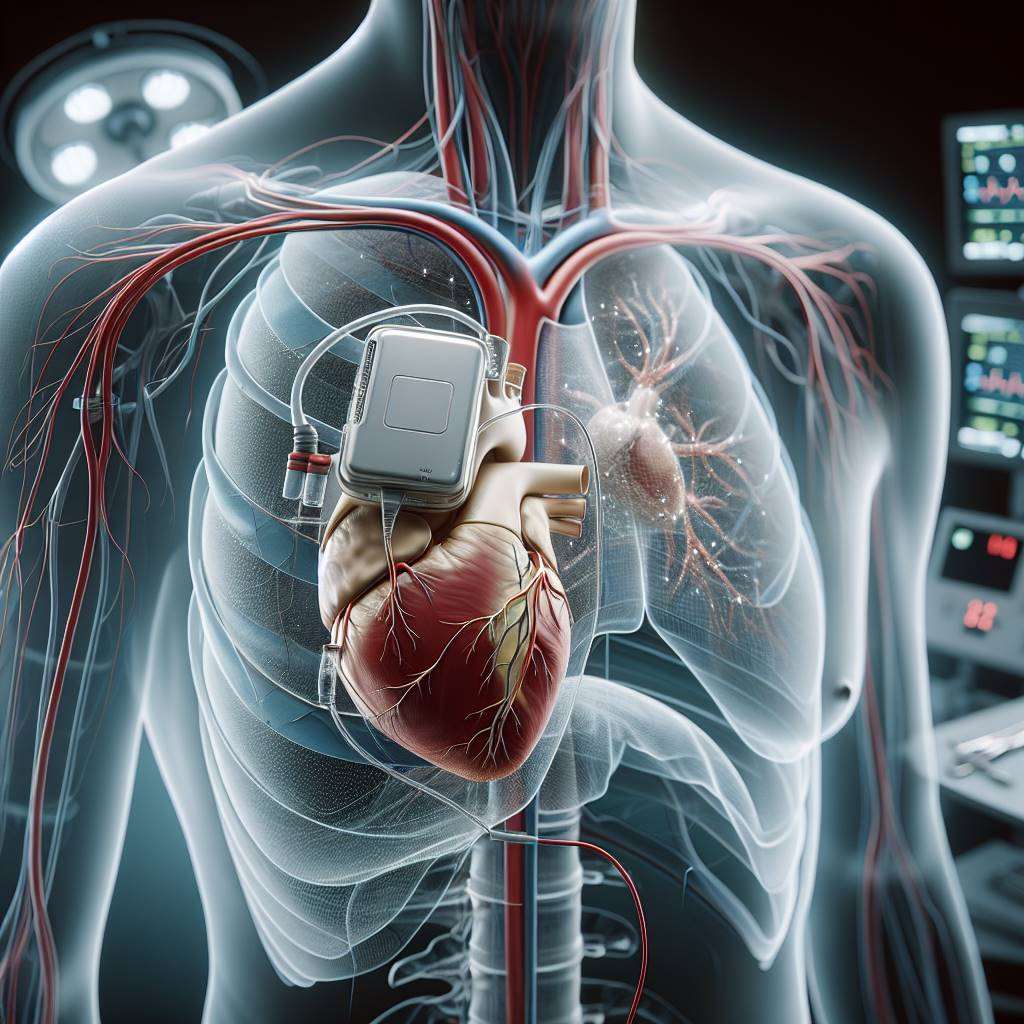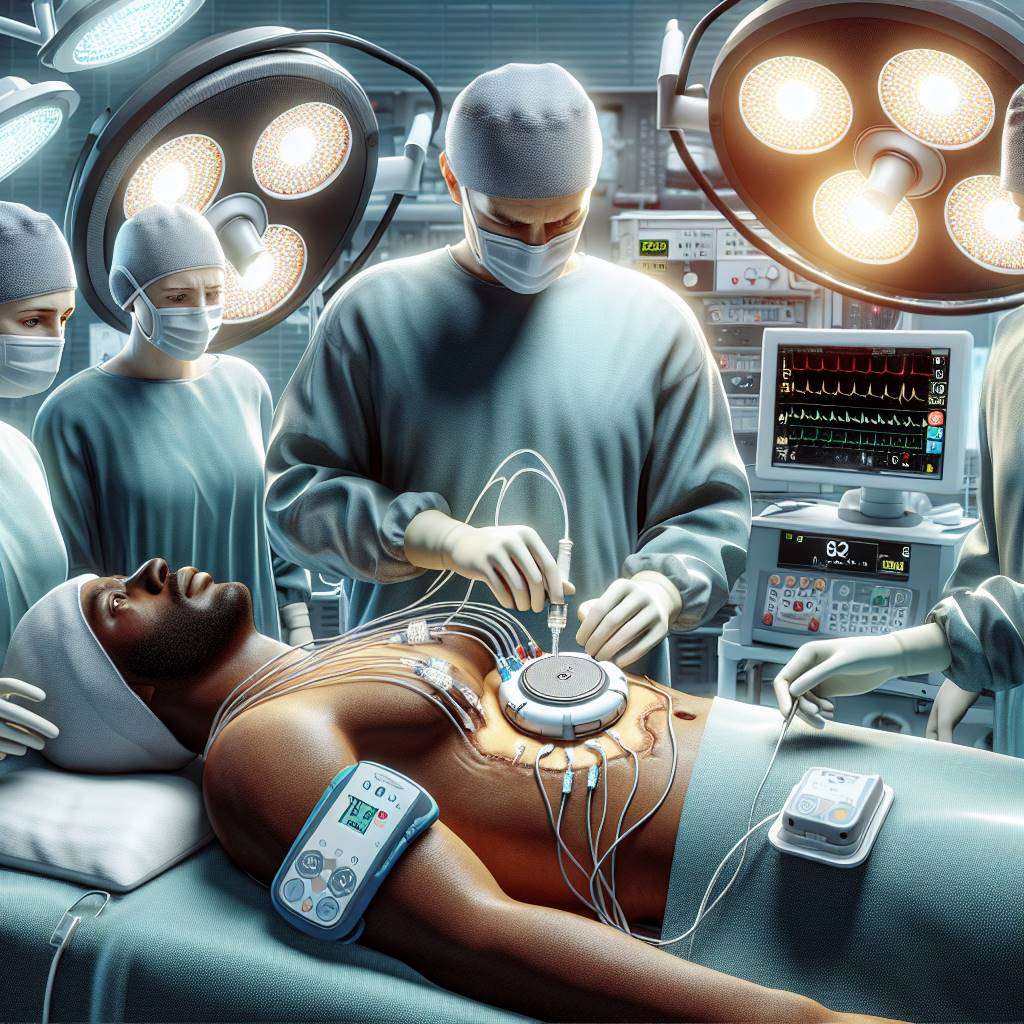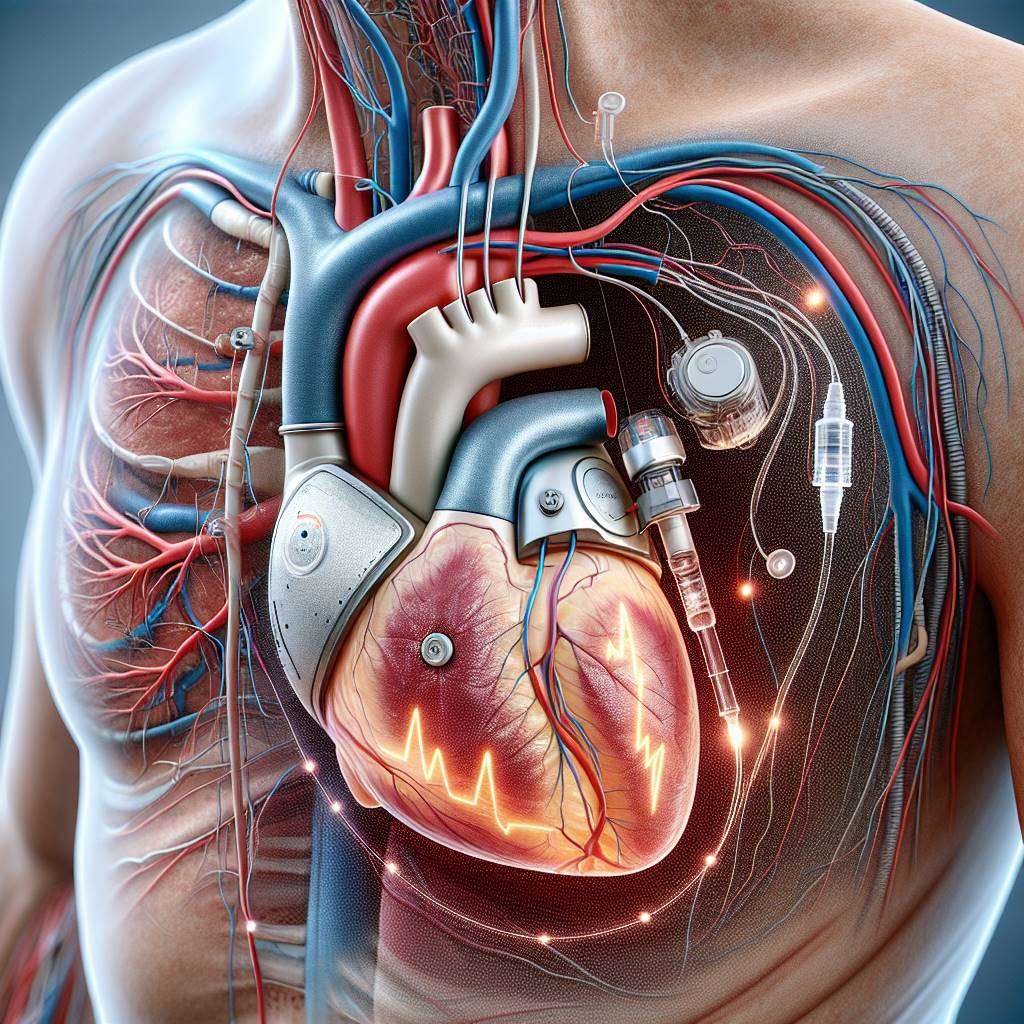An Automatic Implantable Cardioverter Defibrillator (AICD) is a life-saving device designed for patients with heart failure or at risk of sudden cardiac arrest. It continuously monitors the heart's rhythm and delivers electrical shocks to restore normal rhythm when needed. For individuals with severe cardiac conditions, an AICD can significantly reduce the risk of fatal arrhythmias.
Medical disclaimer: This content is for general awareness and does not replace a doctor’s consultation. For diagnosis or treatment decisions, consult a qualified specialist.
Heart failure patients often face an increased risk of complications like ventricular tachycardia or fibrillation. By providing timely intervention, an AICD improves survival rates and enhances quality of life. Understanding its benefits and suitability is crucial for patients and healthcare providers to make informed decisions about managing advanced cardiac conditions.
What Is an AICD and How Does It Work?
An Automatic Implantable Cardioverter Defibrillator (AICD) is a small device implanted under the skin, typically near the chest. It is connected to the heart through thin wires called leads. The AICD continuously monitors the heart's electrical activity and detects abnormal rhythms, such as ventricular arrhythmias, which can be life-threatening.
When the AICD identifies a dangerous rhythm, it delivers a controlled electrical shock to restore the heart's normal rhythm. This process, known as defibrillation, is crucial in preventing sudden cardiac arrest. Modern AICDs are highly advanced, capable of distinguishing between harmless and harmful arrhythmias, ensuring that patients receive appropriate treatment without unnecessary shocks.
The device also stores data about the heart's activity, which can help doctors monitor the patient's condition and adjust treatments as needed. This makes the AICD an essential tool for managing severe cardiac conditions.

Benefits of AICD for Heart Failure Patients
For patients with heart failure, an AICD offers numerous benefits. One of the most significant advantages is its ability to prevent sudden cardiac death by detecting and treating life-threatening arrhythmias. This is particularly important for individuals with weakened heart muscles or a history of ventricular fibrillation.
Additionally, the AICD provides peace of mind for both patients and their families. Knowing that the device can intervene during a cardiac emergency allows patients to lead more active and fulfilling lives. The AICD also reduces the need for frequent hospital visits by automatically managing arrhythmias.
- Continuous monitoring of heart rhythms.
- Immediate intervention during dangerous arrhythmias.
- Improved survival rates for high-risk patients.
- Enhanced quality of life and reduced anxiety.
Can an AICD Prevent Sudden Cardiac Arrest?
Yes, an AICD is specifically designed to prevent sudden cardiac arrest (SCA), a condition where the heart suddenly stops beating due to an electrical malfunction. SCA is often caused by ventricular tachycardia or fibrillation, both of which can be fatal if not treated immediately.
The AICD continuously monitors the heart's rhythm and delivers a shock within seconds of detecting a dangerous arrhythmia. This rapid response is critical in preventing death from SCA. Unlike external defibrillators, which require someone else to operate, the AICD works automatically, making it a reliable option for high-risk patients.
Studies have shown that patients with an AICD have significantly lower mortality rates compared to those without the device. By providing timely intervention, the AICD serves as a safety net for individuals prone to sudden cardiac events.
Who Should Consider Getting an AICD Implant?
Not everyone with heart disease requires an AICD. The device is typically recommended for patients at high risk of life-threatening arrhythmias. This includes individuals with severe heart failure, a history of sudden cardiac arrest, or conditions like hypertrophic cardiomyopathy.
Doctors may also suggest an AICD for patients who have survived a heart attack and have significantly reduced ejection fraction (EF), which measures how well the heart pumps blood. Patients with inherited arrhythmia syndromes, such as Long QT Syndrome, may also benefit from an AICD.
Before recommending an AICD, healthcare providers perform thorough evaluations, including electrocardiograms (ECG), echocardiograms, and stress tests. These assessments help determine whether the patient is a suitable candidate for the device.
How AICD Improves Survival Rates in Heart Failure
The primary goal of an AICD is to improve survival rates in patients with heart failure or other high-risk cardiac conditions. By preventing sudden cardiac arrest, the device significantly reduces mortality rates. Studies have shown that patients with an AICD have a 20–30% higher survival rate compared to those without the device.
The AICD also enhances long-term outcomes by reducing the risk of recurrent arrhythmias. This allows patients to focus on managing their overall health and adhering to other treatments, such as medications and lifestyle changes. The combination of these factors contributes to better quality of life and increased life expectancy.
| Feature |
Impact on Survival |
| Immediate arrhythmia detection |
Prevents sudden cardiac arrest |
| Data storage for monitoring |
Helps optimize treatment plans |
| Automatic defibrillation |
Reduces mortality rates |
Understanding the Risks and Safety of AICD Devices
An Automatic Implantable Cardioverter Defibrillator (AICD) is a life-saving device for patients with severe heart failure or those at risk of sudden cardiac arrest. While the benefits of AICD are significant, it is essential to understand the potential risks and safety considerations.
Common risks include infection at the implant site, bleeding, or device malfunction. However, these risks are rare and can be minimized with proper care and follow-up. The device is designed to monitor heart rhythms and deliver shocks only when necessary, ensuring patient safety.
Patients should discuss their medical history and concerns with their cardiologist to ensure the AICD is the right choice for their condition. Regular check-ups are crucial to monitor the device's performance and address any complications promptly.

AICD vs Pacemaker: Key Differences Explained
Both AICDs and pacemakers are devices used to manage heart conditions, but they serve different purposes. Understanding these differences can help patients make informed decisions about their treatment.
A pacemaker is primarily used to regulate slow or irregular heartbeats by sending electrical impulses to the heart. In contrast, an AICD is designed to detect and treat life-threatening arrhythmias, such as ventricular fibrillation, by delivering a shock to restore normal rhythm.
Here is a quick comparison:
| Feature |
Pacemaker |
AICD |
| Primary Function |
Regulates slow heartbeats |
Treats dangerous arrhythmias |
| Shock Delivery |
No |
Yes |
| Target Patients |
Bradycardia |
Heart failure, high arrhythmia risk |
Both devices are highly effective but cater to different heart conditions. Consult your doctor to determine which device suits your needs.
What to Expect During an AICD Implant Procedure
The AICD implantation procedure is a relatively straightforward process performed under local anesthesia. Patients are typically awake but sedated to ensure comfort during the surgery.
The cardiologist makes a small incision near the collarbone to insert the device. Leads are then guided through blood vessels into the heart to monitor and regulate its rhythm. The procedure usually takes 1–2 hours, and most patients can return home within a day.
After the surgery, mild discomfort or swelling at the incision site is common but subsides within a few days. Patients should follow their doctor’s instructions for wound care and activity restrictions to ensure proper healing.
Regular follow-ups are essential to check the device's functionality and battery life. With proper care, an AICD can significantly improve survival rates for heart failure patients.
Living with an AICD: Tips for Heart Patients
Adjusting to life with an AICD can be challenging initially, but with the right guidance, patients can lead a normal and active life. Here are some tips to help you adapt:
- Follow your doctor’s advice on physical activity. Avoid strenuous exercises that may strain the device.
- Carry an AICD identification card at all times. This helps healthcare providers understand your condition in emergencies.
- Avoid prolonged exposure to strong electromagnetic fields, such as those from MRI machines or industrial equipment.
- Attend regular check-ups to monitor the device and ensure it is functioning correctly.
Emotional well-being is equally important. Joining a support group or speaking with a counselor can help you cope with the psychological aspects of living with an AICD. Remember, the device is there to protect you and improve your quality of life.
Signs You May Need an AICD for Heart Failure
Not all heart failure patients require an AICD, but certain symptoms and risk factors indicate the need for this life-saving device. Recognizing these signs early can be crucial.
Common signs include:
- Frequent episodes of fainting or dizziness due to irregular heart rhythms.
- A history of sudden cardiac arrest or life-threatening arrhythmias.
- Severely reduced ejection fraction (EF) — typically below 35% — indicating poor heart function.
- Unexplained palpitations or rapid heartbeat episodes.
If you experience any of these symptoms, consult a cardiologist immediately. An AICD can significantly reduce the risk of sudden cardiac death and improve survival rates for high-risk patients.
How AICD Monitors and Regulates Heart Rhythms
An Automatic Implantable Cardioverter Defibrillator (AICD) is a life-saving device for patients with severe heart failure. It continuously monitors the heart's rhythm and delivers electrical shocks when it detects dangerous arrhythmias, such as ventricular tachycardia or ventricular fibrillation.
The AICD is implanted under the skin, typically near the collarbone, and connected to the heart via thin wires. It works by identifying irregular heartbeats and restoring a normal rhythm within seconds. This rapid intervention significantly reduces the risk of sudden cardiac death, a common complication in heart failure patients.

Cost of AICD Implantation in India: What to Know
The cost of AICD implantation in India varies depending on the type of device, hospital, and location. On average, the procedure can range from ₹5,00,000 to ₹10,00,000. This includes the cost of the device, surgery, and hospital stay.
While the expense may seem high, many hospitals offer financing options or accept health insurance to make the procedure more affordable. Patients should consult their cardiologist and insurance provider to understand coverage details. Additionally, government schemes like Ayushman Bharat may provide financial assistance for eligible patients.
Investing in an AICD can prevent life-threatening complications, making it a crucial decision for those with advanced heart failure.
Recovery and Aftercare Following AICD Surgery
After AICD implantation, patients typically stay in the hospital for 1–2 days for monitoring. During this time, doctors ensure the device is functioning correctly and educate patients about post-surgery care.
Recovery involves avoiding strenuous activities for a few weeks and keeping the incision site clean to prevent infection. Regular follow-ups with a cardiologist are essential to monitor the device's performance and adjust settings if needed.
- Avoid lifting heavy objects or raising the arm on the side of the implant for 4–6 weeks.
- Report symptoms like dizziness, chest pain, or swelling immediately.
- Carry an AICD identification card at all times.
Proper aftercare ensures the device functions optimally and improves the patient's quality of life.
Latest Advances in AICD Technology for Heart Health
Recent advancements in AICD technology have made these devices smaller, more efficient, and smarter. Modern AICDs now feature wireless connectivity, allowing doctors to monitor the device remotely and adjust settings without invasive procedures.
Some devices also include advanced algorithms to differentiate between harmless and life-threatening arrhythmias, reducing unnecessary shocks. Additionally, newer models have longer battery life, minimizing the need for frequent replacements.
These innovations enhance the safety and comfort of patients, making AICDs a more reliable option for managing severe heart conditions. As technology evolves, AICDs continue to play a pivotal role in improving survival rates for heart failure patients.
Common Myths About AICD Devices Debunked
There are several misconceptions about AICD devices that may discourage patients from opting for this life-saving treatment. One common myth is that AICDs deliver shocks unnecessarily, causing discomfort. In reality, the device activates only during life-threatening arrhythmias.
Another myth is that AICDs interfere with daily activities or electronic devices. Modern AICDs are designed to be safe around most household electronics and allow patients to lead normal lives. Some also believe the surgery is highly invasive, but the procedure is minimally invasive and has a quick recovery time.
Understanding the facts about AICDs can help patients make informed decisions and embrace this effective treatment for heart failure.
Best Aicd Implantation Doctors in India
Dr. Balbir Singh, a renowned cardiologist at Medanta - The Medicity, Gurugram, specializes in electrophysiology and cardiac device implantation with over 30 years of experience. Another expert is Dr. Praveen Chandra from Fortis Escorts Heart Institute, New Delhi, a leading interventional cardiologist with a DM in Cardiology and international recognition for his expertise in advanced cardiac care.
Learn more on best aicd implantation doctors in india
Best Aicd Implantation Hospitals in India
Fortis Escorts Heart Institute, New Delhi, a NABH and JCI-accredited hospital, is a leader in cardiac care with advanced electrophysiology labs and international patient services. Medanta - The Medicity, Gurugram, another NABH-accredited hospital, offers multidisciplinary cardiac care with cutting-edge technologies like robotic surgery and a high success rate in AICD procedures.
Find more best aicd implantation hospitals in india
Aicd Implantation Cost in India
The cost of AICD implantation in India typically ranges from INR 4,00,000 to INR 8,00,000 (approximately USD 5,000 to USD 10,000). Factors like the type of device, hospital category, and doctor’s expertise influence the cost. The average hospital stay is 2–5 days. India offers a significant cost advantage compared to Western countries, with options for medical insurance or third-party financing.
Learn aicd implantation cost in india
Aicd Implantation Treatment in India
AICD implantation in India involves placing the device under the skin near the chest, with leads connected to the heart. Advanced technologies like 3D mapping and minimally invasive techniques are used for precision. Recovery typically takes 1–2 weeks. Top hospitals adhere to global medical protocols and adopt innovations like remote monitoring for better outcomes.
Learn on Aicd Implantation Treatment in India
FAQs
What is an AICD?
An AICD (Automatic Implantable Cardioverter Defibrillator) is a small device implanted in the chest to monitor and correct life-threatening heart rhythm abnormalities, such as ventricular tachycardia or ventricular fibrillation.
Who needs an AICD?
Patients with a history of heart failure, cardiac arrest, or severe arrhythmias that increase the risk of sudden cardiac death are candidates for an AICD.
How does an AICD work?
An AICD continuously monitors the heart's rhythm. If it detects an abnormal rhythm, it delivers electrical shocks to restore a normal heartbeat.
Is AICD implantation a major surgery?
No, AICD implantation is a minimally invasive procedure performed under local anesthesia or mild sedation, typically lasting 1–2 hours.
What are the risks of AICD implantation?
Risks include infection, bleeding, or lead displacement. However, these complications are rare when performed by experienced cardiologists.
How long does an AICD last?
The battery life of an AICD is typically 5–10 years, depending on usage. Regular follow-ups are essential to monitor its performance.
Can I live a normal life with an AICD?
Yes, most patients with an AICD can resume normal activities, with some precautions like avoiding strong electromagnetic fields and high-impact sports.
Is AICD implantation covered by insurance?
Yes, most health insurance policies in India cover AICD implantation. It is advisable to confirm with your insurer regarding specific coverage details.
What is the recovery time after AICD implantation?
Recovery typically takes 1–2 weeks. Patients are advised to avoid strenuous activities and follow their doctor’s instructions during this period.
Can an AICD prevent a heart attack?
No, an AICD does not prevent heart attacks. It is designed to manage life-threatening arrhythmias and prevent sudden cardiac death.
Understanding the Role of AICDs in Cardiac Health
Automatic Implantable Cardioverter Defibrillators (AICDs) play a crucial role in preventing sudden cardiac death, particularly in patients at high risk. Recent studies have shown that AICDs can significantly reduce mortality rates by delivering timely shocks to restore normal heart rhythms. For a deeper dive into the effectiveness of AICDs, check out our article on whether an AICD can prevent sudden cardiac death.
However, the journey with an AICD doesn't end with its implantation. There are instances when an AICD may need to be removed or upgraded due to various factors, including device malfunction or changes in a patient's health status. Understanding when and why these procedures are necessary is vital for ongoing cardiac care. Learn more about this topic in our blog discussing AICD removal or upgrade.
Staying informed about AICDs can empower patients and caregivers to make better decisions regarding heart health and treatment options.